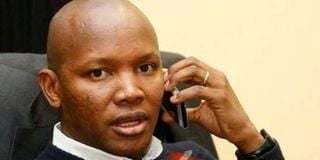‘Please call me’ creator rejects Sh354m from phone company

Nkosana Makate, 44, inventor of the “Please Call Me.
What you need to know:
- Makate is demanding Sh75 billion compensation for coming up with the concept.
- The service is also used by Kenya’s Safaricom, Vodacom sister firm.
South African courts are set to determine whether the R47 million (Sh354 million) paid to the inventor of the “Please call me” service by the cellular giant Vodacom was sufficient.
This is after the inventor, 44-year-old Nkosana Makate, declined the amount calculated by Vodacom CEO Shameel Joosub, saying it was too little.
Makate is demanding R10 billion (Sh75 billion) compensation for coming up with the concept which has since 2001 been used by prepaid phone users to send a free text asking to be phoned back.
The Gauteng High Court in Pretoria has been hearing from both sides over three days from May 4 to 6 with the hope of bringing the 20-year-old saga into a conclusion.
It’s unclear whether the court ruling will have any implication on Kenya’s mobile giant Safaricom, which is a sister company to Vodacom and also uses the “Please call me” messaging service.
Messaging service
Makate, who was an employee at Vodacom, had shared the messaging concept with his employer, but never received payment for it.
He waged a charge against Vodacom and a 2014 judgment in the South Gauteng High Court supported Makate's claim to having originated “Please call me.”
The court also rejected former CEO Alan Knott-Craig's claim that he had come up with the idea of the messaging service.
However, the high court ruling, against Makate, held that Geissler did not have the authority to promise Makate such compensation and that the debt would have expired (in legal terms, been prescribed) within three years.
Makate appealed the case, and later took it to the constitutional court. In 2016, Makate won his legal bid to force the leading mobile phone firm to pay him for inventing the popular messaging service after the country's highest court ordered the firm to compensate their ex-employee.
Nine-year court battle
Following the ruling, Vodacom CEO Shaamel Joosub offered him R47 million, but Makate declined the amount saying it was too little.
Makate returned to court in a nine-year battle, this time accusing Vodacom of breaching an agreement to pay him.
The firm defended itself that the amount they gave Makate was “substantial” and would “stand the scrutiny of the courts”.
“We have acted ethically in resolving the matter,” it said in 2019. “We call for sane heads to prevail in our current highly politicised environment as we resolved this matter.”
Further, the company had argued that when “Please call me” was launched, it did not generate any revenue for Vodacom as subscribers were not charged for the service.
Acceptable remedy
“It was offered for free. The intended plan to charge for it after an initial period was abandoned, since there were many similar services in the market, which were offered for free. It’s not, nor ever has been a money-spinner.”
However, Makate’s legal representatives in 2019 suggested that “Please call me” generated at least R205 billion (Sh1.5 trillion) in call revenue for Vodacom since 2001.
Fin24 media reported that on day one of the three-day hearing last week, Makate's legal team presented possible remedies to the presiding judge Wendy Hughes.
Senior Counsel Gilbert Marcus, representing Makate, said they had arrived at the conclusion that substitution would be an acceptable remedy. It would mean the court would ultimately be the decision maker when it came to determining the compensation amount, and not CEO Joosub.
"So instead of sending the matter back to the CEO for a new determination, we are asking that the court make the determination," Marcus explained.





